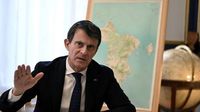On April 4, 2025, Donald Trump, the President of the United States, made headlines by launching what he termed a "declaration of economic independence." This bold move involves the implementation of tariffs on a vast array of products from countries around the globe, a decision that has sparked significant controversy and concern among international leaders and affected nations.
The tariffs are set to impact a wide range of goods, with the intention of reshaping trade relationships and asserting U.S. economic sovereignty. According to Trump, this initiative is aimed at protecting American jobs and industries, a sentiment that resonates with many of his supporters who feel that globalization has undermined domestic manufacturing.
However, the reaction from other countries has been swift and critical. Manuel Valls, the French Minister for Overseas Territories, described the situation as "very chaotic" during an interview on Franceinfo. He expressed strong opposition to the tariffs, labeling them a "scandalous commercial attack" on French territories. Valls emphasized the adverse effects these tariffs could have on the economies of Guadeloupe, Martinique, Guyana, and Mayotte, which will see their products taxed at 10%.
In a particularly striking example, La Réunion, which shares the same legal status as the other territories, is facing a staggering 37% tariff on its exports. Furthermore, products imported from Saint-Pierre-et-Miquelon will incur a hefty 50% tax, while those from French Polynesia will be subject to a 10% tariff. Valls criticized the U.S. administration's approach, suggesting that it could lead to severe economic repercussions for the middle and working classes, potentially plunging them into precarious situations.
Valls did not shy away from expressing his concerns about the broader implications of these tariffs, referring to the situation as a "trade war led by Donald Trump and Steve Bannon." He argued that this aggressive stance represents a shift in U.S. alliances and poses a threat to the economic model and democratic structures in Europe. "If we enter this trade war that the Americans desire, we must be prepared," he warned, advocating for what he termed an "intelligent and strategic response" to the unfolding crisis.
The French government is now faced with the challenge of navigating this turbulent trade environment while supporting its overseas territories. Valls hinted at the possibility of reevaluating the inclusion of these territories in international trade agreements, stating, "We will see. Everything is negotiable." His remarks underscore the uncertainty and urgency surrounding the situation as the French government considers its options.
Meanwhile, Trump's supporters argue that these tariffs are essential for revitalizing the U.S. economy and securing American interests abroad. They believe that by imposing these tariffs, Trump is taking a necessary stand against unfair trade practices that have long favored other nations at the expense of American workers.
Critics, however, warn that such a confrontational approach could lead to retaliatory measures from affected countries, escalating tensions and potentially sparking a global trade war. The ramifications of this economic strategy could extend beyond immediate financial implications, affecting diplomatic relations and international cooperation on various fronts.
As the situation develops, observers are closely monitoring the reactions from both domestic and international stakeholders. The potential for widespread economic disruption looms large, and many are left wondering how this new phase of U.S. trade policy will shape the future of global commerce.
In the coming weeks, it will be crucial for the U.S. administration to engage in dialogue with affected nations to mitigate the fallout from these tariffs. The stakes are high, and the complexities of international trade demand careful consideration and strategic planning.
As global leaders respond to Trump's tariffs, the world watches closely, awaiting the next moves in what could become a protracted and contentious economic battle. The unfolding drama not only highlights the intricacies of trade relationships but also serves as a reminder of the interconnectedness of the global economy.
In conclusion, the declaration of economic independence by President Trump marks a significant turning point in U.S. trade policy, with profound implications for both domestic and international markets. The coming days and weeks will reveal how this bold strategy plays out on the world stage and what it means for the future of American economic relations.




